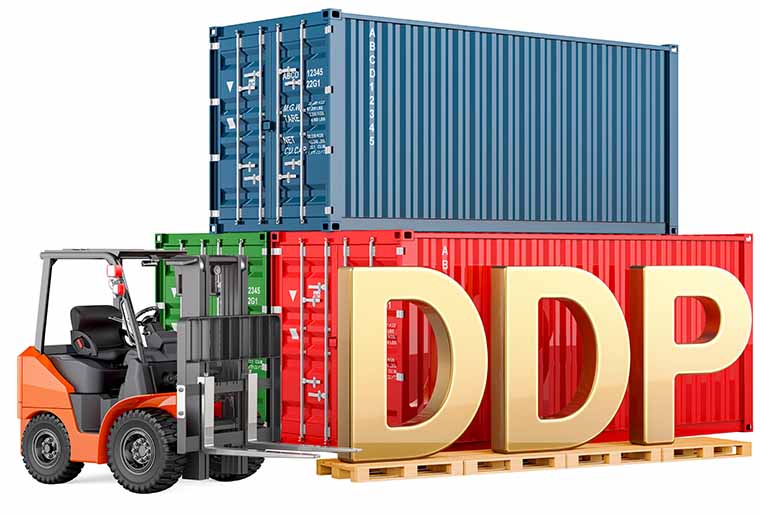In the complex world of international trade, Incoterms play a fundamental role in defining the responsibilities of buyers and sellers in each transaction. Among these terms, DDP (Delivery Duty Paid) stands out for offering maximum convenience to the importer, who receives the shipment at the agreed-upon location with all expenses covered by the seller.
This article delves into the Incoterm DDP, explaining its characteristics, obligations of the parties involved, cases in which its use is appropriate, and additional aspects to consider for an informed choice.
Join us on this journey to better understand how DDP works and thus make informed decisions regarding your imports.
What is an Incoterm in logistics?
Incoterms, short for International Commercial Terms, are a set of standardized rules and practices that define the responsibilities of the seller and the buyer in an international commercial transaction. These terms establish who pays what and when during the shipping process, as well as the transfer of risk and delivery of the goods.
There are 11 different Incoterms, each with its own characteristics and obligations for the parties involved. Incoterms are classified into four groups:
- Group C: The seller delivers the goods without assuming further liability.
- Group E: The seller delivers the goods at a specified point, assuming the
costs of transportation up to that point.
- Group F: The seller delivers the goods on board the main means of transport (ship, aircraft, etc.), assuming the costs up to that point.
- Group D: The buyer assumes responsibility for the goods from the moment they are delivered on board the main means of transport.
What is a DDP shipping?
The Incoterm DDP, or Delivery Duty Paid, stands for “Delivery Duty Paid.” Under this term, the seller assumes ultimate responsibility for the shipping process, delivering the goods to the agreed-upon location (the buyer’s factory, a warehouse, etc.) and covering all associated expenses, including:
- Inland transportation in the country of origin: From the seller’s warehouse to the point of shipment.
- Customs clearance at origin: Processing of the necessary documents for the goods to leave the seller’s country.
- International ocean freight: Cost of transporting the goods by sea.
- Arrival charges (or destination charges): Fees and charges associated with the arrival of the goods to the destination country, such as unloading and handling.
- Customs clearance at destination: Processing of the necessary documents for the entry of the goods into the buyer’s country.
- Payment of taxes and duties: Taxes and duties applicable to the import of the goods.
- Inland transportation in the country of destination: From the point of arrival to the location agreed upon with the buyer.
In short, the DDP Incoterm offers the buyer maximum convenience, as they don’t have to worry about any aspect of the shipment. The seller handles everything from origin to final destination, delivering the goods ready for use.
Seller’s Obligations in a DDP Shipping
As mentioned above, the seller assumes most of the responsibilities in a DDP shipment. Their main obligations include:
- Delivery of the Goods and Necessary Documents: The seller must deliver the goods to the location agreed upon with the buyer, along with all necessary shipping documentation, such as the commercial invoice, certificate of origin, and packing list.
- Packaging and Crating: The seller must package and pack the goods appropriately to protect them during transport.
- Payment of All Expenses: The seller must cover all expenses associated with the shipment, including transportation, insurance, duties, and taxes.
- Assuming Risks Until Delivery: The seller is responsible for the goods from the moment they leave their warehouse until they are delivered to the buyer.
Buyer’s Obligations in a DDP Shipping
The buyer’s obligations in a DDP shipment are minimal, as the seller handles most of the process. However, the buyer does have some responsibilities, such as:
- Payment for the goods: The buyer must pay the seller the agreed-upon price for the goods.
- Receipt of the goods: The buyer must receive the goods at the agreed-upon location and verify that they are in good condition.
- Notify the seller of any problems: The buyer must notify the seller immediately if there are any problems with the goods or the shipment.
When is the Incoterm DDP a good option?
The Incoterm DDP is a good option for:
- Importers who want to minimize their involvement in the shipping process: If the importer is inexperienced in international logistics or does not want to deal with the complexities of shipping, DDP may be a good option.
- Importers who need fast and secure delivery: DDP offers a high level of control to the seller, which can help ensure fast and secure delivery of the goods.
- Importers expecting receipt of high-value goods: The DDP Incoterm can be a good option for importers handling high-value goods, such as industrial machinery, electronic equipment, or jewelry.
In these cases, the value of the goods justifies the additional cost of using a term like DDP, as the seller assumes responsibility for the goods throughout the entire shipping process. This can help protect the importer from financial loss if the goods are damaged or lost during transit.
Considerations for a DDP Shipping
It is important for the importer to carefully evaluate their needs and preferences before choosing an Incoterm. DDP may be a good option in some cases, but it is not the only term available. If you are the importer, before applying the DDP Incoterm to your shipment, keep the following considerations in mind:
- Cost: The DDP Incoterm is usually the most expensive for the importer, as the seller assumes most of the costs.
- Control: The importer has minimal control over the shipping process, as the seller handles everything.
- Flexibility: The DDP Incoterm is not as flexible as other Incoterms, as the seller is not required to deliver the goods at a specific point.
Additional Tips for Choosing the Right Incoterm
Still unsure whether DDP is the best Incoterm for your next shipment? Take note of these tips to help you choose:
- Consider your experience in international logistics: If you are inexperienced, DDP may be a good option.
- Evaluate the value of the goods: If the goods are high-value, DDP may be a good option to protect your investment.
- Consider your control needs: If you need greater control over the shipping process, choose an Incoterm that offers more flexibility.
- Negotiate with the seller: The Incoterm used in an international trade transaction is negotiable between the buyer and the seller. It’s important to discuss your needs and preferences with the seller to reach an agreement that’s satisfactory to both parties.
- Consult with international shipping experts: Partida Logistics provides the advice you need, suggesting the Incoterms that best suit your needs. Contact us!
Frequently Asked Questions
What does “Delivery Duty Paid” (DDP) mean for the buyer?
DDP signifies the maximum responsibility for the seller, meaning the goods are delivered to the final agreed-upon location in the buyer’s country with all expenses—including customs duties, taxes, and all transport costs—already covered. The goods arrive “duty paid” and ready for the buyer to unload.
When does the risk transfer from the seller to the buyer under DDP?
The transfer of risk occurs at the latest possible point in the transaction: when the goods are placed at the disposal of the buyer at the named destination, ready for unloading from the arriving means of transport. The seller assumes all risk of loss or damage until that specific moment.
Why is DDP generally the most expensive Incoterm option for the importer?
DDP is the most expensive because the final sales price includes not only the cost of the goods but also all logistics costs, insurance, export fees, international freight, and crucially, all import duties and taxes (VAT/GST) in the destination country. The seller consolidates all these expenses into a single, high price.
Can the buyer choose their own customs broker for clearance under DDP?
No. Under DDP, the seller is fully responsible for import clearance and the payment of duties and taxes. This means the seller must use their own customs broker or agent, leaving the buyer with minimal control over the import customs process.
Is the seller legally required to purchase cargo insurance under DDP?
The DDP Incoterm does not mandate the seller to purchase insurance for the buyer’s benefit. However, because the seller retains all risk until final delivery, they are strongly incentivized and will almost always purchase insurance to protect their own financial exposure against loss or damage during transit.
What Incoterm is considered the functional opposite of DDP?
The functional opposite of DDP is EXW (Ex Works). Under EXW, the seller has the minimum obligation, only making the goods available at their premises, while the buyer assumes all costs, risks, and responsibilities from that point forward, including all transportation and customs formalities.




